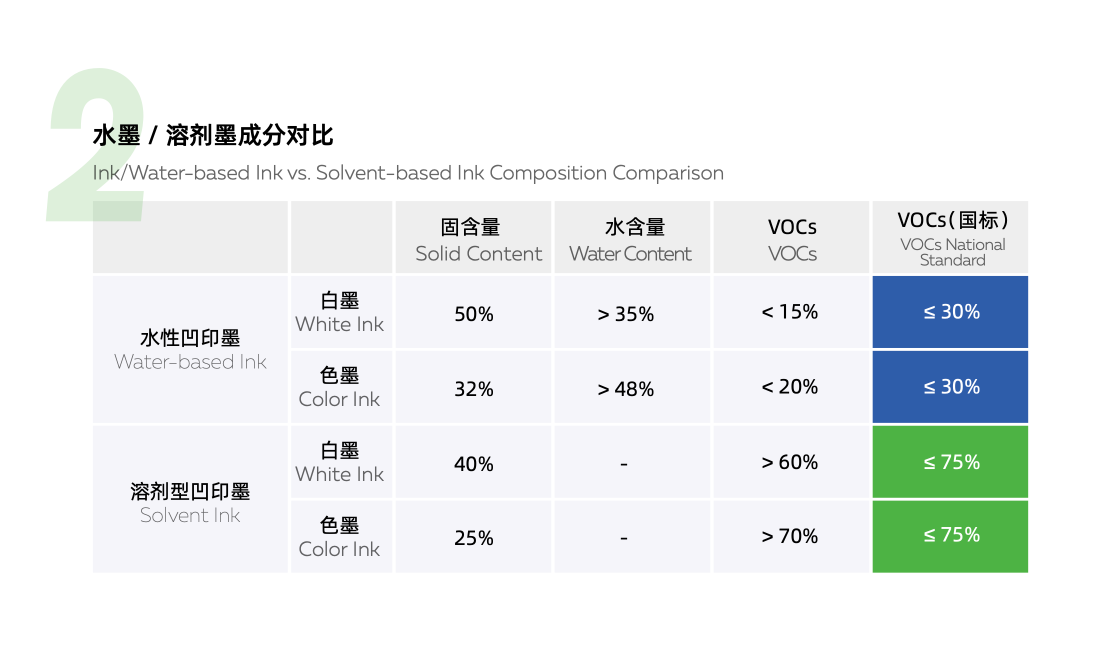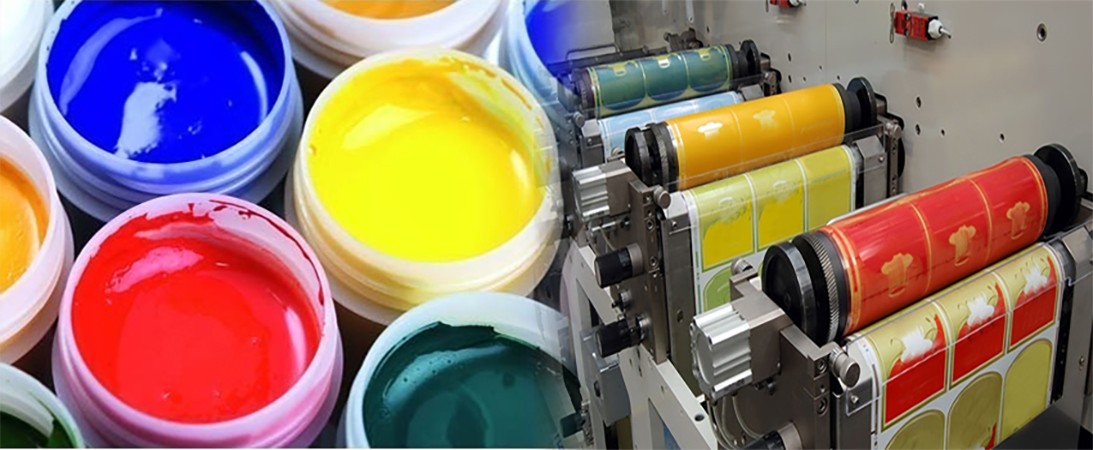Introduction

In the ever-evolving world of printing, water-based inks have revolutionized the industry, offering a more sustainable and environmentally friendly alternative to solvent-based inks. As concerns about the environmental impact of solvent-based inks continue to grow, businesses are turning to water-based eco-solvent inks as a more responsible choice for their printing needs. Leading the way in this shift is Qinghe Chemical, a company dedicated to developing innovative water-based ink solutions that prioritize both performance and sustainability.
The Rise of Water-Based Inks
As businesses and consumers become increasingly conscious of their environmental footprint, the demand for water-based eco-solvent inks has surged. This shift is driven by the desire for a more sustainable and eco-friendly alternative to traditional solvent-based flexographic inks. With advancements in technology and formulation, water-based inks have proven to be a viable solution for various printing applications.
Water-based inks offer a range of benefits beyond their eco-friendly nature. These inks are known for their low odor, making them more pleasant to work with than traditional solvent-based inks. Additionally, water-based inks are easier to clean up, reducing the time and effort required for maintenance and minimizing the environmental impact. This has made them an attractive option for businesses looking to enhance their sustainability efforts while improving workplace conditions.
The Environmental Impact of Solvent-Based Inks
Solvent-based inks have long been associated with harmful volatile organic compound (VOC) emissions, posing serious risks to air quality and human health. As regulations on VOC emissions become stricter, businesses seek alternatives that minimize their environmental impact without compromising print quality or durability.
As regulations on VOC emissions become stricter, businesses seek alternatives that minimize their environmental impact without compromising print quality or durability. One such alternative is water-based inks, which have gained popularity for their lower VOC emissions and reduced environmental impact. By transitioning to water-based inks, businesses can demonstrate their commitment to sustainability while still achieving vibrant and long-lasting printed materials.
Qinghe Chemical: Leading the Way in Water-Based Inks
Qinghe Chemical has emerged as a pioneer in developing high-quality water-based ink solutions that offer a sustainable and efficient alternative to solvent-based printing ink. Their commitment to innovation and sustainability has positioned them as leaders in driving the industry towards more environmentally responsible practices.
Qinghe Chemical's water-based ink solutions provide a more sustainable and environmentally friendly option and deliver high-quality results that meet the demands of modern printing applications. Their dedication to innovation has led to the development of inks that offer vibrant colors, excellent adhesion, and fast drying times, making them a top choice for businesses looking to reduce their environmental impact without sacrificing print quality.
Understanding Ink Technologies

When it comes to printing, the choice of ink can significantly impact the final result. Solvent-based inks have been a popular choice for their fast drying time and durability, making them ideal for outdoor applications such as banners and vehicle wraps. However, they have drawbacks, such as high VOC emissions and environmental concerns.
On the other hand, water-based inks offer a more environmentally friendly alternative with lower VOC emissions and reduced health risks for workers. They also provide vibrant colors suitable for indoor applications like posters and packaging. However, challenges such as longer drying times and limited substrate compatibility have hindered their widespread adoption.
For those seeking a sustainable compromise between solvent-based and water-based inks, eco-solvent inks are gaining popularity. These inks use a combination of less harmful solvents to the environment while still offering the durability and versatility of solvent-based inks. With technological advancements, eco-solvent inks are becoming viable for various printing needs.
Now that we've explored the pros and cons of solvent-based ink, water-based ink, and eco-solvent ink, it's clear that each option has its own set of advantages and challenges. The choice ultimately depends on specific printing requirements, environmental considerations, and long-term sustainability goals. As the demand for greener alternatives continues to grow, eco-solvent inks are poised to become an increasingly popular choice for businesses seeking to minimize their environmental impact while maintaining high-quality prints.
Performance and Durability

When it comes to print quality and color accuracy, solvent-based inks have long been favored for their vibrant hues and sharp details. However, water-based eco solvent inks are quickly closing the gap, offering comparable results with the added benefit of being more environmentally friendly. With technological advancements, eco solvent inks can now produce prints with exceptional color accuracy and high-definition details, making them a competitive alternative to traditional solvent-based flexographic ink.
Longevity and resistance to environmental factors are crucial considerations for any printing ink. Solvent-based inks have historically been known for their durability and ability to withstand harsh conditions, making them ideal for outdoor applications. However, water-based eco solvent inks have also made significant strides in this area, with improved resistance to fading and weathering. As a sustainable alternative, eco solvent inks offer impressive longevity while minimizing environmental impact.
Flexibility and versatility in applications are key factors when choosing between solvent-based ink vs water-based ink. While traditional solvent-based printing inks have been widely used across various industries, water-based eco solvent inks are gaining traction due to their ability to adhere to a wide range of substrates. From vinyl banners to vehicle wraps, eco solvent inks provide the flexibility needed for diverse printing needs without compromising performance or quality.
Now that we've explored the performance and durability of both types of inks, it's clear that the choice between solvent-based and water-based options is no longer black and white. With advancements in technology driving innovation within the printing industry, businesses must consider not only print quality but also environmental impact when making their decisions. As consumer demand for sustainable solutions grows, water-based eco-solvent inks are poised to become an increasingly popular choice for businesses prioritizing performance and sustainability.
Environmental Considerations

VOC Emissions and Air Quality
Solvent-based inks are known for their high levels of volatile organic compound (VOC) emissions, which can contribute to poor air quality and harm human health. These emissions are released during the drying process of solvent-based inks, leading to smog formation and potential respiratory issues for workers and nearby communities.
Health and Safety Regulations
Due to the harmful nature of VOC emissions from solvent-based inks, strict health and safety regulations have been implemented to protect workers and the environment. Companies using solvent-based printing inks must implement ventilation systems, personal protective equipment, and regular air quality monitoring to ensure compliance with these regulations.
In addition to these regulations, companies are encouraged to explore alternative, more sustainable ink options. Water-based and UV-curable inks are becoming increasingly popular as they emit lower levels of VOCs and are considered more environmentally friendly. By transitioning to these alternatives, companies can reduce their impact on the environment and improve the overall health and safety of their workers.
Sustainability and Corporate Responsibility
In today's environmentally conscious climate, businesses increasingly prioritize sustainability and corporate responsibility. This includes shifting towards eco-friendly ink solutions such as water-based eco-solvent inks, which offer a more sustainable alternative to traditional solvent-based inks. By adopting these eco-friendly options, companies can demonstrate their commitment to reducing their environmental footprint.
In addition to reducing their environmental footprint, businesses can benefit from cost savings by switching to eco-friendly ink solutions. Water-based eco-solvent inks are often more affordable than traditional solvent-based inks, allowing companies to save money while positively impacting the environment. This cost-effectiveness can be a compelling reason businesses switch and align their operations with sustainable practices.
Cost and Efficiency

Solvent-based inks have traditionally been favored for their lower upfront production and operating costs. However, the ongoing costs of solvent-based flexographic ink can add up due to the need for specialized equipment and higher energy consumption. On the other hand, water-based eco-solvent inks may have slightly higher initial costs. Still, they offer significant savings in the long run through reduced maintenance and lower energy usage.
Production and Operating Costs
The debate about solvent-based ink vs. water-based ink often centers around production and operating costs. While solvent-based inks may seem more cost-effective, their reliance on complex machinery and ventilation systems can drive up expenses over time. In contrast, water-based inks are easier to handle and require less intensive equipment, reducing production costs and a more sustainable printing process.
Maintenance and Equipment Compatibility
Maintenance is another key factor when comparing solvent-based ink to water-based ink. Solvent-based inks often necessitate frequent cleaning of printing equipment due to residue buildup, resulting in increased downtime and maintenance expenses. Conversely, water-based eco-solvent inks are known for compatibility with a wide range of printing equipment and require minimal maintenance, contributing to greater efficiency and cost savings.
Overall Return on Investment
When evaluating the overall return on investment (ROI), solvent-based inks may offer lower upfront costs but higher long-term operational expenses. Water-based eco-solvent inks present a compelling case for a more sustainable investment with lower maintenance requirements, reduced energy consumption, and compatibility with standard printing equipment—ultimately leading to a higher ROI over time.
Market Trends and Future Outlook
Consumer Preferences and Industry Shifts
As consumer awareness of environmental issues grows, there is a noticeable shift towards eco-friendly printing solutions. This has increased demand for water-based eco-solvent inks that offer a more sustainable alternative to traditional solvent-based inks. With more businesses and individuals prioritizing environmentally friendly options, the printing industry is adapting to meet these changing consumer preferences.
Technological Innovations and Research Developments
Recent advancements in ink technologies have focused on improving the performance and durability of water-based eco-solvent inks, making them more comparable to solvent-based options. Manufacturers are investing in research and development to enhance color accuracy, print quality, and resistance to environmental factors. These innovations drive the industry towards a future where eco-friendly inks can deliver the same high standards as their solvent-based counterparts.
Predictions for the Printing Industry
Looking ahead, the printing industry will continue to prioritize sustainability and environmental responsibility. As regulations on VOC emissions become stricter, there will be a greater emphasis on water-based ink solutions that minimize environmental impact. Additionally, technological advancements will improve the performance of eco-solvent inks, making them increasingly competitive with traditional solvent-based options.
Remember: The future of printing is evolving towards more sustainable practices with an emphasis on water-based eco-solvent inks as a viable alternative to traditional solvent-based options!
Qinghe Chemical: Shaping the Future of Printing Inks

When it comes to the future of inkjet printing, the choice is clear: sustainable and eco-friendly options like water-based and eco-solvent inks are leading the way. As consumer preferences shift towards environmentally conscious products, making informed decisions for your printing needs is crucial. With Qinghe Chemical at the forefront of developing cutting-edge water-based inks, the future of printing inks will be both sustainable and innovative.
The Future of Inkjet Printing: A Sustainable Choice
As technology advances and environmental awareness grows, the future of inkjet printing lies in sustainable choices like water-based and eco-solvent inks. These alternatives to solvent-based inks offer a more environmentally friendly option without compromising performance or print quality. By embracing these sustainable choices, the printing industry can move towards a greener future while meeting the demands of a changing market.
Making Informed Decisions for Your Printing Needs
With the rise of water-based and eco-solvent inks, businesses must make informed decisions when choosing their printing solutions. Understanding the advantages and challenges of each ink technology can help companies align their printing needs with their environmental values. Businesses can make choices that benefit their operations and the planet by considering factors such as print quality, durability, environmental impact, and cost efficiency.
Qinghe Chemical has been at the forefront of developing innovative water-based inks, revolutionizing the printing industry. By prioritizing sustainability and corporate responsibility, Qinghe Chemical is shaping the future of printing inks with its commitment to eco-friendly solutions that deliver exceptional performance. As consumer preferences drive industry shifts towards sustainability, companies like Qinghe Chemical lead by example in creating a greener and more sustainable future for inkjet printing.

